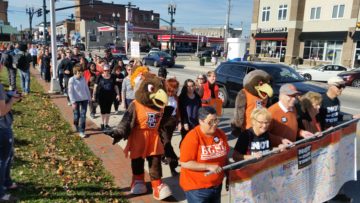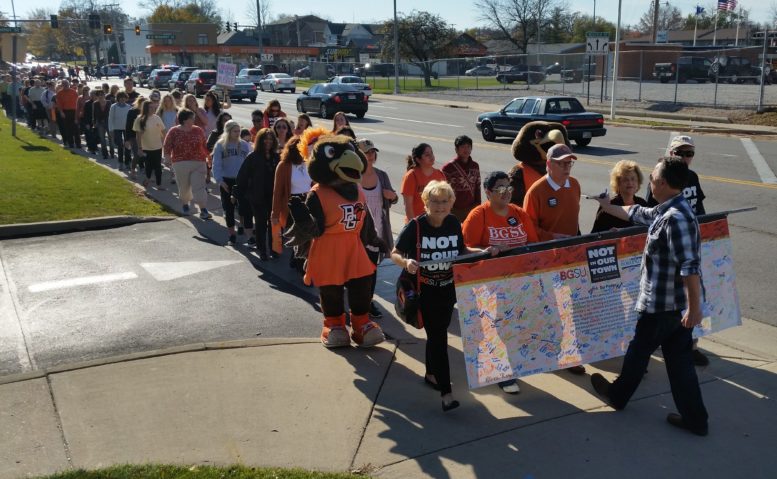By JAN LARSON McLAUGHLIN
BG Independent News
On the heels of a very divisive election season, nearly 400 people marched for peace and unity in Bowling Green on Friday. They came pushing strollers, riding bicycles, walking dogs and carrying signs with slogans like “We shall overcome” and “Librarians for peace and justice.”
The march, organized by Not In Our Town, started downtown and ended in front of the student union at Bowling Green State University. City officials walked next to students and faculty. University officials marched next to families and public school leaders.
Matt Lavery, who recently moved to Bowling Green from Florida, joined in the march.
“When I heard about this initiative, I thought it was the project to join up with,” Lavery said. “I think it’s too easy for people to focus on our differences, rather than our similarities. And if we’re not in this together, what’s it all about?”
At the front of the march, carrying a section of the Not In Our Town banner, was Rev. Gary Saunders, who said the event gave people a positive way to stand up against hateful behavior.
“This is drawing together what we think is the best voice of Bowling Green,” Saunders said.
People from other communities also joined in, like Christina Kern from Cygnet.
“We’re from small towns, and we don’t have a voice there. And the violence is just too much,” Kern said.

Peace march makes its way down East Wooster Street
They came seeking peace for those parts of the population who were further marginalized by the election.
“I’m here in solidarity,” said Nancy Patterson, voicing support for women, the LGBTQ community and Muslims. Patterson was a Fulbright Scholar in Morocco, and later had a Muslim Moroccan student live with her family while she studied at BGSU.
“I’m here because I’m afraid and I needed some hope,” Patterson said as the march concluded on campus. “This feels like hope and healing.”
Many students also joined in, like Aurelian Greeno.
“I want to make sure our community stays safe and everyone is allowed to be who they are,” Greeno said.
Also leading the march were Bowling Green Mayor Dick Edwards and BGSU President Mary Ellen Mazey.
“The turnout was beyond what I hoped,” Mazey said. “It’s about celebrating our diversity. You could see the diversity among the group.”
And the point is inclusion for all, Edwards said. “It’s about stomping out hate in any form.”
The community and campus were rocked last week when two racially-motivated attacks were reported by students, one on Crim Street and the other on campus near the student recreation center.
After investigations by city and campus police, both cases are thought to be bogus.
“The incident didn’t happen as it was reported,” Thomas Gibson, BGSU vice president for student affairs and vice provost, said of the on-campus report.
In the other case, city police have charged Eleesha Long, 24, with filing a false police report. Bowling Green Police Chief Tony Hetrick, who participated in the peace march, said his department made Long’s alleged attack a priority – pulling two detectives off a sexual assault case, an arson case and several drug investigations to work on Long’s case. But the investigation showed Long’s claim of being assaulted and called racial slurs was bogus.
Gibson, who also attended the march, sent out a message to the campus, trying to calm concerns.
“Our campuses and their surrounding communities are by-and-large safe places with very low crime rates. I hope the resolution of these alleged incidents helps to begin to restore a sense of security,” Gibson wrote. “At the same time, I want to be clear that this does not absolve us from continuing our important dialogue on diversity and inclusion. As President Mazey has indicated, we must be ever vigilant in ensuring that there is no place for racism, sexism, homophobia, intolerance or other bias at Bowling Green State University. There are members of our community who do not feel safe. That is unacceptable.”

